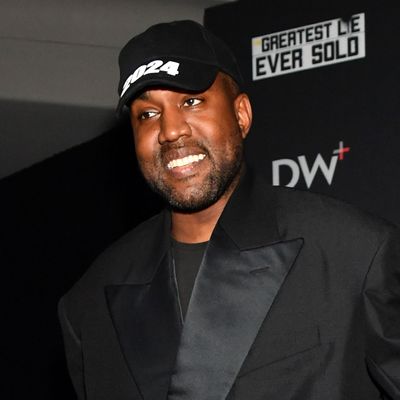
Last week, Kanye West, who now goes by Ye, announced on Twitter that he was “going death con 3 On JEWISH PEOPLE,” earning wide condemnation and a suspension of his account. What came next was anyone’s guess: An apology tour? Doubling down? Intervention? Not quite:
Parlement Technologies announced today that it has entered into an agreement in principle to sell Parler, the world’s pioneering uncancelable free speech platform, to Ye (formerly known as Kanye West). Ye has become the richest Black man in history through music and apparel and is taking a bold stance against his recent censorship from Big Tech, using his far-reaching talents to further lead the fight to create a truly non-cancelable environment.
Yesterday’s announcement from right-leaning social-media platform Parler also included a statement attributed to Ye, who has not otherwise acknowledged the plan. “In a world where conservative opinions are considered to be controversial,” he is quoted as saying, “we have to make sure we have the right to freely express ourselves.” (A note of caution here in response to early coverage of this potential deal. Nothing is done yet, and we know very little about the shape or size of the proposed transaction, which involves some historically unreliable characters. It comes after weeks of unpredictable and especially self-destructive behavior by Ye, who has spoken frequently about his struggles with mental health.)
It’s a bizarre situation, to be sure, and one that not even the closest Ye-watchers saw coming. In a broad sense, though, it’s a story we’ve heard elsewhere recently: A powerful, unpredictable man with a significant presence on social media gets fed up with a platform and decides that the only solution is to own the place. Elon Musk is now mired in an incredibly messy bid for Twitter. Donald Trump did it, sort of, with Truth Social. As the account for the House Judiciary Committee Republicans cryptically posted just a couple of days before Ye’s post about “JEWISH PEOPLE”:
Musk’s plan was, and maybe still is, to buy actual Twitter, and Truth Social is best understood as a sort of bio-dome habitat for Trump posts, which have some sort of audience on and off the platform. Parler, on the other hand, is an undistinguished member of the broader class of “alt-tech” platforms that have sprung up over the last five years and experienced a miniature Cambrian explosion after Trump was banned from multiple major platforms, cumulatively raising hundreds of millions of dollars — much of which came from ideologically motivated investors.
Virtually all of these platforms — other examples include Gab, Gettr, and Rumble — have struggled to attract and retain large numbers of users. A common and fair critique of these platforms is that they never offer users what they truly enjoyed about Twitter: the experience and spectacle of conflict and a feeling, or at least a simulation, of mass movement. For staunch Trump supporters, Twitter was a place to feel, at turns (and sometimes in the space of a few seconds), empowered and aggrieved — like part of a rising movement with plans to take back the world as well as a member of a persecuted class constantly reminded of the existence of legions of evil quote-tweeting enemies.
Trump’s tweets summoned thousands of instant expressions of anger, fear, exhaustion, and contempt from an extraordinary range of public figures across industries and disciplines in replies, TV segments, and articles. Trump’s Twitter previewed, then paralleled an essential component of, his political appeal: an eagerness and, crucially, an ability to say wild, offensive, or simply petty things in a context where other powerful people were required to care about them and felt the need to respond. For Trump and his online base, Twitter, where virtually every member of the elite MAGA enemies list has a blue check, offered a unique product: direct lib-triggering at scale. For free! An incredible deal and probably a fatal indictment of the entire platform but, nevertheless, we post on.
Adjacency to power and influence is similarly core to Ye’s identity as a public figure. In recent years, he has been at his most visible and queasily compelling when locked in uneasy partnerships, then conflict, with established brands: Def Jam, Adidas, the Gap, Balenciaga, the Kardashians, Twitter, Instagram. He presents them with a creative opportunity, which often bears fruit, followed shortly thereafter by one or more impossible choices, resulting (almost inevitably) in a spectacular dissolution of the partnership and ending with a story of betrayal, conspiracy, and (usually) a motivating grudge. Difficult to watch but impossible to ignore: a potent form of celebrity!
One can imagine the pitch to Ye for buying Parler: It’s like Twitter, or Facebook, except you can’t be banned and you get to be in charge. Trump did it — why not Ye? One problem is that, even by the low standards of its peers, Parler is a ghost town. It’s a place where Ye can post and people really can ignore him. It’s a place with no adjacency to power, elite discourse, or celebrity. It lacks the raw material with which Ye usually works. It’s an environment where he’ll find neither success nor trouble. It’s barely an environment at all. The few people who seem to be there don’t know Ye for his music or work in fashion and view him in the hazy, heavily racialized terms of his relationship with Trump and his appearances in the tabloids. It’s not a useful platform for a Ye or, for that matter, a Musk or a Trump. It would be closer to a quarantine.
Parler’s situation is worse than the already grim alt-tech default. For a brief time, it became an off-Twitter hub for “Stop the Steal” election denialism, resulting in a number of its users effectively reporting themselves to the FBI by posting footage of their visits to the Capitol on January 6. This earned the platform, which was very loosely moderated, bans from the iOS and Android app stores and Amazon’s hosting service. Apple and Google have since reinstated the app under the condition of tighter moderation, undermining its already thin credibility as a “free speech” platform to those who would take such claims seriously in the first place.
What little energy the platform ever had seems to have drained out of it. Parler’s own post about its “intent to sell” to Ye inspired a muted and mixed response on the platform. “I just joined after watching Fox and Friends,” wrote a user named Doris. “I will give it a try with a smile.” Another user wrote that he “didn’t see this as a plus and will likely leave Parler if he purchases it,” adding, for clarity, that he is specifically sick of Ye’s “demographic.” User “Exotic Classics of Alabama” suggested that he signed up because Ye actually “hit the nail on the head” about the “Jewish community.” Other users, some verified, complained about the general state of things. Some of the most supportive messages were from people who had signed up minutes earlier. Others were checking back in after quitting months ago. “Sadly, the truth is that Parler’s dying,” wrote one user who has been posting since February. A guy named Bruce issued an ultimatum: “Maybe Ye will implement a larger font that doesn’t discriminate against people older than 30. Otherwise, no thanks!”
Conservative alt-tech is, in personnel terms, largely an extension of the MAGA-verse — here, Devin Nunes and Jason Miller are tech CEOs and everyone’s angling for a deal in the form of a SPAC — which means it’s important to ask who, in a given arrangement, might be getting taken for a ride. Users? Investors and partners? The media? The case of Parler suggests another angle: the owner. Ye’s recent run of questionable choices kicked off with a “White Lives Matter” shirt at Paris Fashion Week, which he wore alongside Candace Owens, a pro-Trump influencer. (“I love the way Candace Owens thinks,” Ye tweeted in 2018. The two have remained in contact ever since — to the chagrin of Ye’s family and friends.)
Owens, a former Turning Point USA employee and current Daily Wire host, who is Black, is co-founder of Blexit Foundation (as in “Black exit from the Democratic Party”). Another relevant fact is that she’s married to George Farmer, Parler’s CEO. Farmer, who is quoted in the deal announcement as saying it will “change the world,” adds that Ye “will never have to fear being removed from social media again.” The announcement, which suggests the deal “would include ongoing technical support from Parlement and the use of private cloud services via Parlement’s private cloud and data center infrastructure,” isn’t incompatible with the sale of a lemon and raises questions about what, exactly, would be changing hands here. The brand? The template? The site’s remaining members? It appears user Rcapre, who signed up in November 2020, will at least be part of the package. “At 76, it’s refreshing to someone with conviction like Ye!” he wrote. “Good luck.”






























